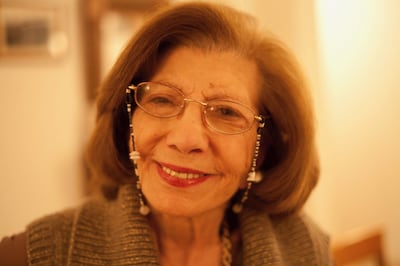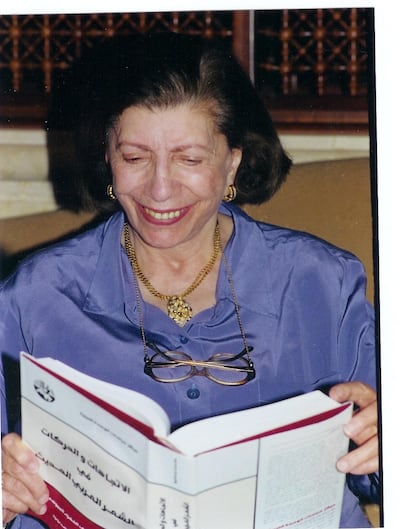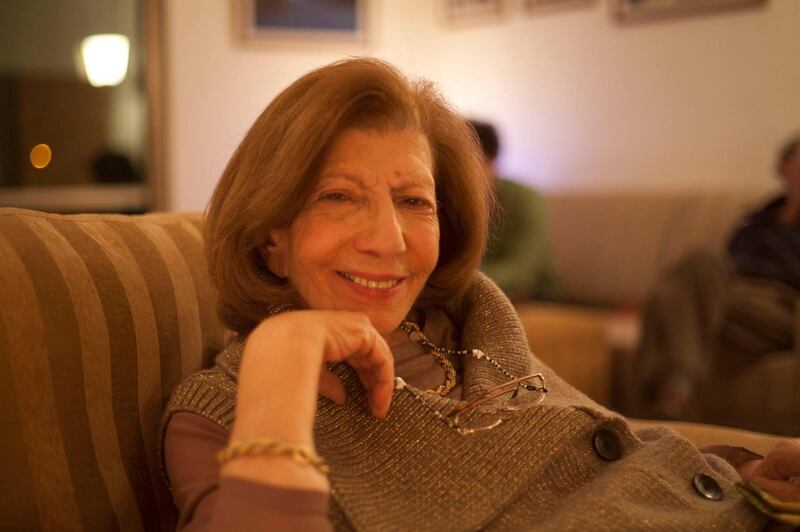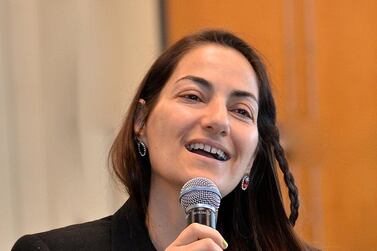Few writers have been as instrumental in introducing Arab culture and literature to the wider world as Salma Khadra Jayyusi.
That is why her recognition as the Cultural Personality of the Year by the Sheikh Zayed Book Award this month should come as no surprise.
In fact, the accolade for Jayyusi, 94, could perhaps be considered a little overdue.
The Palestinian poet has been actively promoting the wider dissemination of Arab literature since at least 1980, when she founded the Project of Translation from Arabic (Prota).
Since then, she has translated works by numerous Arab authors into English, anthologising them into volumes and writing critical introductions to help readers better understand the context of the literary genres and works included. Today, the anthologised works have become staples in libraries across the US, Europe and the Middle East.
"Prota was my way of 'teaching' Arabic literature," Jayyusi tells The National. "The books we translated and published are on the syllabi of Arabic programmes at all the major universities and are in constant use."
Jayyusi began studying Arabic literature in the 1940s, first at the Beirut College for Women and then at the American University of Beirut, from which she graduated in 1945. After that, she moved back to Palestine to work at the Teachers' Training College in Jerusalem.
However, she didn't stay there for long.

Finding inspiration in Baghdad
“In 1947, I moved to Jordan with my husband, who was a Jordanian diplomat,” she says. “And then it was Rome, Madrid, Baghdad and London in turn.”
It was in Baghdad that Jayyusi first became seriously involved in the Arab literary scene, meeting Iraqi poets such as Nazik Al Malaika and Badr Al Sayyab, both of whom profoundly inspired her own works.
“Al Malaika changed the metrics of Arabic poetry. I always like reading her poetry, even to this day,” she says. “Al Sayyab’s works speak with a profound language about the deep concerns of ordinary Arabs, with a poetry that is rich with imagery and music.”
Jayyusi left Baghdad to pursue a PhD in Arabic literature and travelled to London in the mid-1950s.
However, her time in the British capital was short-lived as the Suez Canal crisis broke out in 1956 and Jayyusi’s husband became a political refugee in Syria. She joined him there.
"The Damascus period was very rich in literary and intellectual occasions and connections," she says. "I started doing translations of important literary and critical works into Arabic, most notably the first two volumes of Lawrence Durrell's The Alexandria Quartet."
In 1960, Jayyusi and her husband moved to Lebanon where her literary activities found further inspiration.
Putting the Palestinian experience into prose
Jayyusi published her first poetry collection Return from the Dreamy Fountain that same year. The works in her first collection addressed the collective predicaments the Arab world faced then: from the loss of Palestine to colonial settlement in 1948, to the Suez Canal crisis.
“The hopes and struggles for freedom and independence, as well as the necessities of commitment and sacrifice, were the major topics of public life at the time,” Jayyusi says. “Poets and critics, of course, expressed these in their work.”
One of the works from her debut collection, Rootless, was a long free-verse poem on the Palestinian Nakba and the experience of becoming a refugee through exodus.
“It had a particularly strong reception among poetry readers then,” she says. “There are quite a few poems in my first collection that speak of this bitter Palestinian experience.”
Jayyusi was involved in the free-verse poetry movement from the start of her career, which encouraged the use of free language and breaking out of traditional structures, while paying special attention to the musicality and metre of each line.
She says that her earlier poems are far less personal than her later works, which utilise more contemporary idioms and diction.
“My more recent poems highlight experiences that speak of the different ways of being human,” she says. “Poems about friendship, about death, about sickness; about the experience of being alone.
"There are feminist poems and poems that address the increasingly harsh and difficult developments that we suffered in the Arab world, ones that shattered many of the dreams and hopes we had earlier held dear.”

Bringing Arab literature to the 'world stage'
After publishing her first poetry collection, Jayyusi decided to leave Lebanon for Kuwait, before travelling to England to continue her PhD on trends and movement in contemporary Arabic poetry at the University of London, from which she graduated in 1970. Her study on 100 years of Arabic poetry was published as a two-volume work in 1977 and remains the major reference on the topic today.
Jayyusi then began her pedagogical journey, teaching at the University of Khartoum from 1970 to 1973 and at a number of universities in Algeria until 1975. She then went to the US on visiting professorships, eventually founding Prota in 1980 in Boston.
“In 1984, after visiting the Nobel Academy Library in Stockholm and discovering that all they had of Arab literature were four slim and unremarkable volumes, I made the decision to drop everything else and dedicate myself to bringing Arab literature on to the world stage,” Jayyusi says.
A painful loss
Many years later, tragedy struck Jayyusi's family with the death of one of her three children, Usama, in 2015. In her 1986 poem To Usama, Jayyusi expresses the special relationship she shared with her son, writing: "Without your presence / All time of day and night are void." The poem continues: "Should I blame you? / And you offered me the promise, a pledge of calm / A love like a tide that comes ashore / Only to recede."
Jayyusi says that the loss of her only son was a "bitter blow that overshadowed everything". She has subsequently been unable to keep in touch with the developments of Arabic poetry over the past few years, "much to my regret", says Jayyusi.
However, she believe today's poetic output in the Arab world seems robust and hopes contemporary scholars will set their sights on today's Arabic poetry to encourage its development.
Though in her mid-90s, Jayyusi is showing no signs of slowing down in her work. She has now moved to Amman, where she lives with her two daughters, and seeks to be active in the poetry community there.
She is currently writing her memoir, a task she says she finds "rather difficult because it concerns a penetration into one’s private self".
But, she says, "I am determined to continue."








